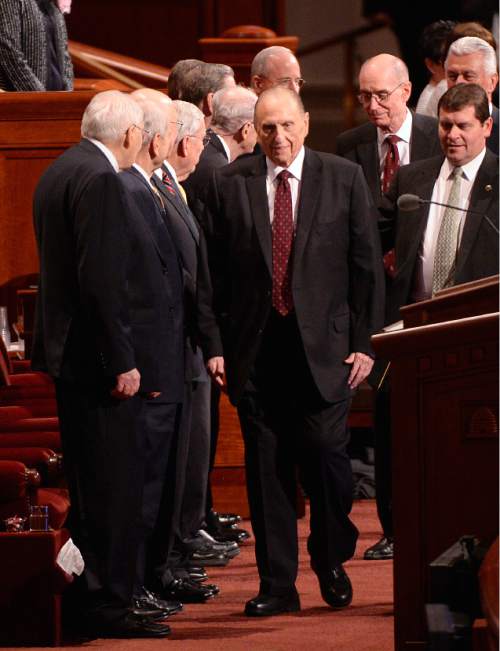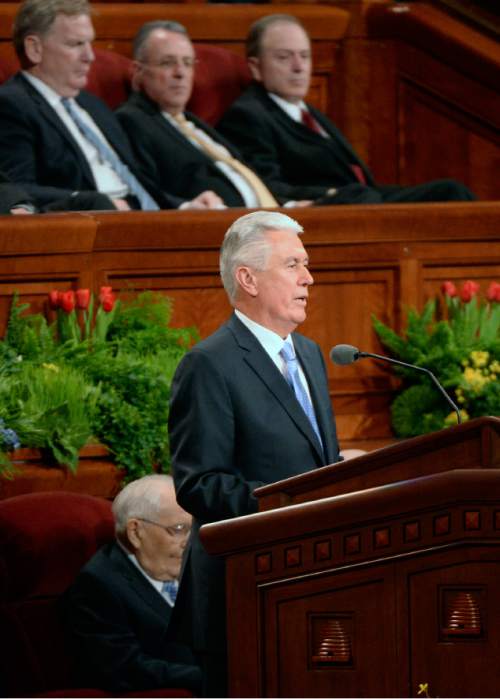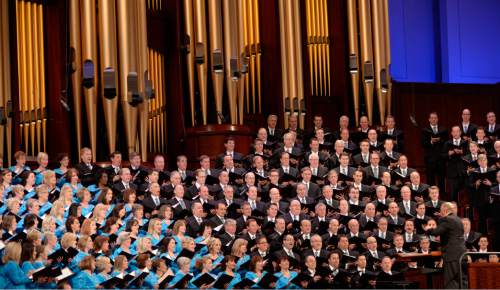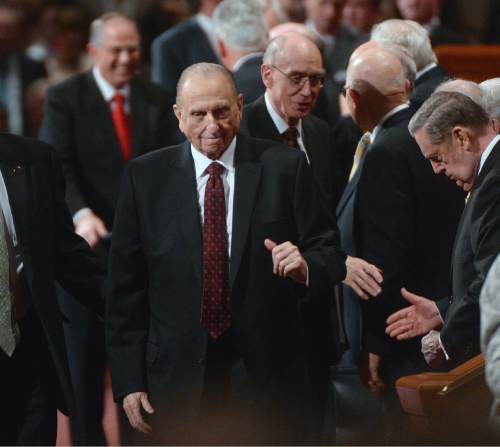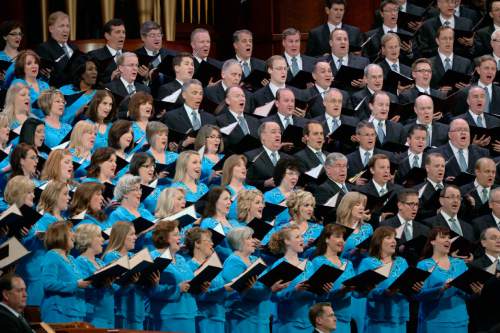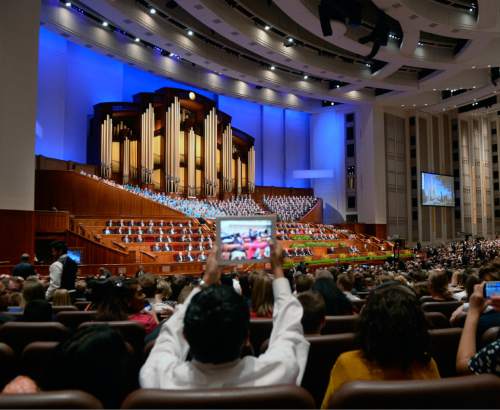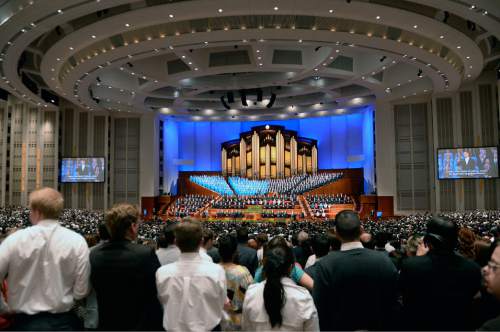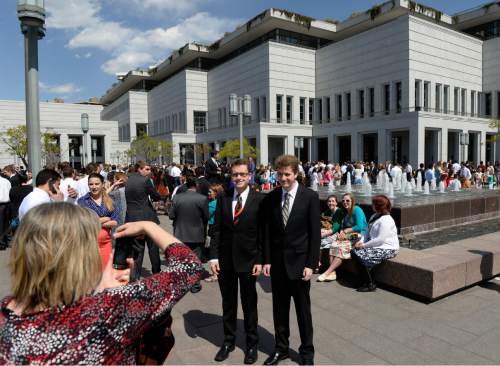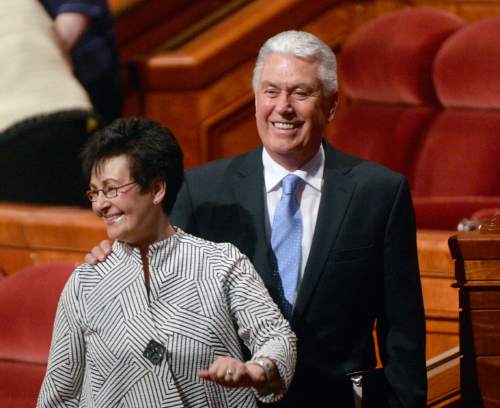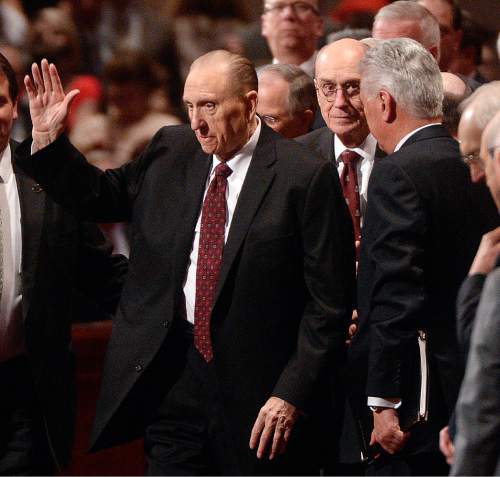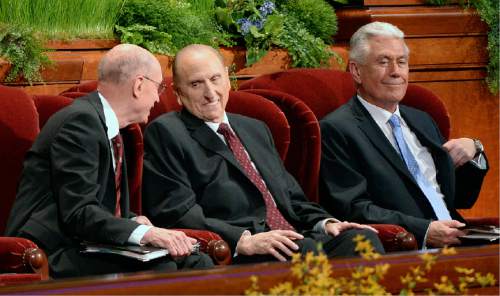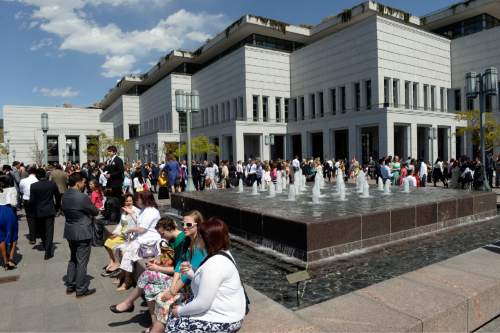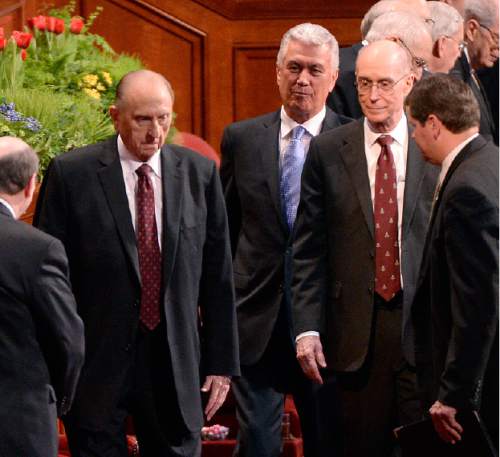This is an archived article that was published on sltrib.com in 2015, and information in the article may be outdated. It is provided only for personal research purposes and may not be reprinted.
Unlike Saturday's sessions of General Conference, Mormons didn't have to wait long Sunday to hear from LDS Church President Thomas S. Monson.
And the Mormon leader didn't wait long to make news, either.
Delivering the opening address at the Easter morning service, the 87-year-old leader announced plans to build three new LDS temples — in Bangkok, Thailand; Abidjan, Ivory Coast; and Port-au-Prince, Haiti.
In his short sermon Sunday, Monson discussed the value of the faith's temples.
In his seven years as church president, among his most "enjoyable and sacred" responsibilities, he said, has been the chance to dedicate and rededicate temples.
The building of temples, Monson said, "is a very clear indication of the growth of the church."
As Mormons reflect on the covenants they make in the temple, they "will be better able to overcome ... temptations and to bear our trials," he said. "In the temple we can find peace."
The blessings of the temple "are priceless," he said. " ... May our Heavenly Father bless us that we may have the spirit of temple worship, that we may be obedient to his commandments, and that we may follow carefully the steps of our Lord and Savior, Jesus Christ."
On Saturday morning, Monson skipped his customary welcome and didn't speak until that evening's all-male priesthood session. He also didn't deliver his traditional closing remarks Sunday afternoon — part of an effort to reduce his speaking load.
In the end, Monson gave two sermons this weekend. And he did attend — and preside at — all six sessions of the spring gathering.
Ivory Coast's 20 million people includes more than 22,000 Mormons, according to an LDS Church news release. Haiti, with 10 million, has more than 19,000 Latter-day Saints.
The Bangkok edifice will be the first LDS temple in Thailand, which has about 18,000 Mormons, says the release. Right now, members there must travel more than 1,000 miles, to Hong Kong, to reach the closest LDS temple.
The Church of Jesus Christ of Latter-day Saints has 144 operating temples worldwide. Another 29 have either been announced or are under construction.
Public tours of the Payson temple, the faith's 15th in Utah, are scheduled to begin April 24. The building's dedication is set for June 7.
Mormons view temples as houses of God, places they take part in their faith's highest sacraments, including eternal marriage.
Several other speakers Sunday discussed the Easter events of Christ's suffering in Gethsemane, death on the cross and resurrection from a tomb.
"This is the most sacred day of the year for special remembrance of brotherly hands and determined arms that reached into the abyss of death to save us from our fallings and our failings, from our sorrows and our sins," apostle Jeffrey R. Holland said. " ... Today we celebrate the gift of victory over every fall we have ever experienced, every sorrow we have ever known, every discouragement we have ever had, every fear we have ever faced — to say nothing of our resurrection from death and forgiveness for our sins."
All that Jesus experienced in those three days "constitutes the most important moment, the most singular sacrifice, the most consequential manifestation of divine love ever to be demonstrated in the history of the world," Holland said. " ... Jesus still stands triumphant over death, although he stands on wounded feet. This Easter I thank him and the Father who gave him to us that Jesus still extends to us unending grace, although he extends it with pierced palms and scarred wrists."
Dieter F. Uchtdorf, second counselor in the faith's all-male governing First Presidency, focused the bulk of his Easter sermon on the notion of divine grace.
"We cannot earn our way into heaven; the demands of justice stand as a barrier, which we are powerless to overcome on our own," Uchtdorf said. "But all is not lost. The grace of God is our great and everlasting hope."
That grace, though, does not merely erase sins and mistakes, the German leader said. Divine aspiration for humans "is much higher: He wants his sons and daughters to become like him. With the gift of God's grace, the path of discipleship does not lead backward, it leads upward. It leads to heights we can scarcely comprehend."
Are Mormons "confident and comfortable in our good deeds, trusting in our own righteousness? Are we perhaps a little impatient with those who are not living up to our standards? Are we on autopilot, going through the motions, attending our meetings, yawning through Gospel Doctrine class, and checking our cellphones during sacrament service?" Uchtdorf wondered. " ... Thinking that we can trade our good works for salvation is like buying a plane ticket and then supposing we own the airline. Or thinking that after paying rent for our home, we now hold title to the entire planet Earth."
If grace is a free gift, he asked, why be obedient to God's laws?
Simply put, he said, believers do it "out of love."
"Trying to understand God's gift of grace with all our heart and mind gives us all the more reasons to love and obey our Heavenly Father with meekness and gratitude," Uchtdorf said. "As we walk the path of discipleship it refines us, it improves us, it helps us to become more like him, and it leads us back to his presence."
Two other speakers Sunday morning talked about members who wander from the fold.
Rosemary M. Wixom, general president of the Primary (for LDS children), told of an inquisitive young Mormon mother, beset by doubts about the church and its teachings.
Despite her challenging questions, Wixom said, those around the mother continued to treat her with respect.
The women's parents "knew my heart and allowed me space," the woman told the Primary leader. Her bishop "spoke of his confidence in her" and fellow members extended courtesy, love and kindness.
"I did not separate myself from the church because of bad behavior, spiritual apathy, looking for an excuse not to live the commandments, or searching for an easy out," the woman said in explaining why she became less involved in the religion. "I felt I needed the answer to the question: 'What do I really believe?' "
The woman reported that her Mormon faith "had become like a pile of ashes," Wixom said. "It had all burned down. All that remained was Jesus Christ."
Eventually, the mother began to rebuild, step by step , on that faith.
"She could focus on the truths she did believe," Wixom said, "and let those truths fill her mind and heart."
The Primary leader concluded that she hoped to be "like those who surrounded this young mother, loving and supporting her" — and urged her listeners to do likewise.
Brent H. Nielson, of the First Quorum of the Seventy, talked about his sister Susan and her 15-year disaffection from the Utah-based faith.
The whole family continued to love her, include her and her children in activities, and support her educational achievements, Nielson said. "We learned in our family that, after all we can do, we love that person with all of our hearts and we watch, we pray, and we wait for the Lord's hand to be revealed."
Years later, Susan returned to full LDS activity, he said. "The windows of heaven have opened to her children and grandchildren, and although there have been difficult consequences, it feels as if she never left."
In the process, Nielson had an epiphany reading the biblical story of the prodigal son, who squandered his inheritance. His father later greeted him with great affection, much to the dismay of an older brother who had never left.
"I had always related to the son who stayed home," an emotional Nielson said. " ... That morning, I realized that in some ways I was the prodigal son. All of us fall short of the glory of [God] the father. All of us need the Savior's atonement to heal us. All of us are lost and need to be found. This revelation that day helped me know that my sister and I both needed the Savior's love and his atonement. Susan and I were actually on the same path back home."
Moral agency is critical to Mormon belief, apostle Robert D. Hales said Sunday afternoon.
Hales, speaking while seated due to health concerns, mentioned four "cornerstones of religious freedom" that Latter-day Saints embrace: freedom to believe, freedom to share beliefs with others, freedom to form a religious organization and "to worship peacefully with others," and freedom to live one's faith.
"As disciples of Christ we have a responsibility to work together with like-minded believers, to raise our voices for what is right," Hales said. "While members should never claim or even imply that they are speaking for the church, we are all invited, in our capacity as citizens, to share our personal witness with conviction and love."
Mormons are responsible "to safeguard these sacred freedoms and rights," he said, "for ourselves and our posterity."
Hales' comments come nearly a month after Utah adopted an LDS Church-endorsed nondiscrimination law, which provides protections for the lesbian, gay, bisexual and transgender community while safeguarding religious liberties for faith organizations and their affiliates. The landmark measure has won praise from religious and LGBT advocates — and even President Barack Obama during his recent visit to the Beehive State.
Fellow apostle Richard G. Scott did not speak this weekend, "for health reasons," according to LDS Church spokesman Dale Jones. The 86-year-old leader "is watching General Conference at home."
Joseph W. Sitati, of the First Quorum of the Seventy and the only conference speaker from Africa, said "laboring in the spirit of charity is not a duty but a joy. Challenges become opportunities to build faith."
Sitati spent his childhood "in humble circumstances typical to many families in Africa," he said. "I gained the ability to lift myself from those circumstances by seeking and obtaining, with the caring help of my parents, a good education. Developing a vision of what I could become was essential to my progress."
As believers "look to the Lord for help, we have found answers that bring peace and comfort and we do not feel overwhelmed by these things," Sitati said. " ... Faithful Latter-day Saints who understand their divine potential and rely wholeheartedly on the power available through the atonement of the Lord Jesus Christ are strengthened in their natural weakness and 'can do all things.' "
Mormons are "disciples of the Lord Jesus Christ," apostle Neil L. Andersen said. "We have taken his name upon us, and each week, as we partake of the sacrament, we pledge that we will remember him and keep his commandments. We are far from perfect, but we are not casual in our faith. We believe in him. We worship him. We follow him. We love him."
Believing that God and Jesus are leading the way, Andersen said, helps Latter-day Saints recognize God's "miracles" — including the new temples mentioned by Monson — in the church's work and in members' lives.
He urged believers to see "the hand of the Lord in the work of his kingdom and in your own life," the apostle said. "Prepare for and anticipate his coming return, rehearsing these glorious events over and over in your own mind and with your family and friends."
Twitter: @religiongal


